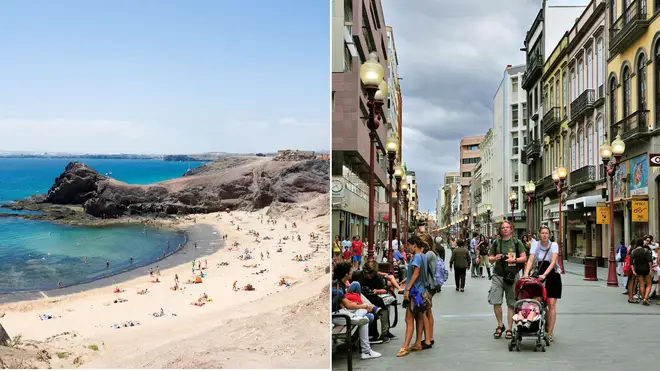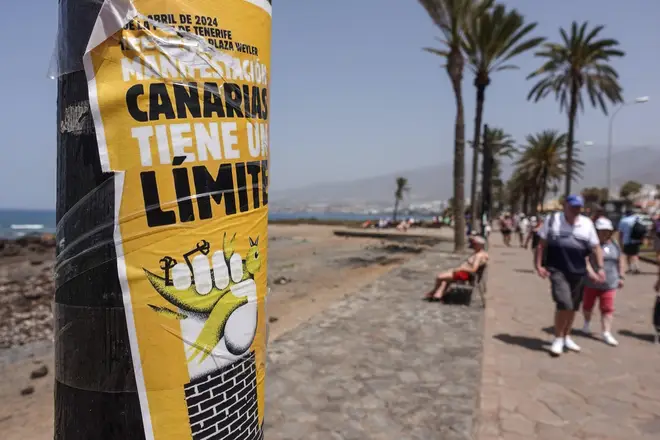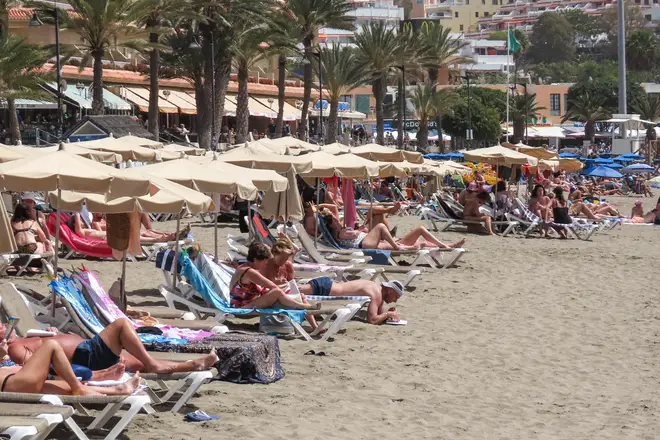
Nick Abbot 10pm - 1am
19 April 2024, 13:34 | Updated: 19 April 2024, 13:49

The Canary Islands tourism minister has pleaded with British holidaymakers not to cancel their holidays despite anti-tourism protests set to take place.
Locals have voiced their outrage in recent weeks over water usage, a lack of housing and pollution across the islands - and have blamed the issues on over tourism.
Messages of 'go home' have been written in graffiti across walls, leaving some feeling unwelcome in the region.
But despite the recent outbreak of anti-tourism rhetoric in the area, the regional tourism chief Jessica de León has stressed that the islands are still open for business.
She told the Telegraph: “It is still safe to visit the Canary Islands, and we are delighted to welcome you.”
Ms de León acknowledged the frustrations of locals over matters such as a lack of housing but added it was “unfair to blame tourism”.
Meanwhile, the Canary Islands president Fernando Clavijo suggested that some of the sentiments expressed by locals “smack of tourist-phobia”.
“People who come here to visit and spend their money must not be criticised or insulted. We are playing with our main source of income,” Mr Clavijo said.

It comes as British holidaymakers have reportedly been calling hotels in Tenerife to ask if it’s still safe for them to visit amid a series of protests planned across the islands.
Tourism accounts for roughly 40 per cent of the local economy in the Canary Islands, as the region welcomes some 12.3 million each year.
Foreign visitors spent more than €20.3 billion in the region last year, accounting for around a fifth of spending throughout Spain.
Last year alone, the islands hosted some 16.2 million tourists, 5.6 million of which were British tourists.
Activists are scheduled to hold a mass demonstration in Arrecife and Lanzarote on Saturday to fight for the “conservation of natural spaces, a tourist moratorium, and tougher regulation for foreigners buying property”.
Flyers for the event assert that the islands “have a limit”.
Activists are planning further marches across Tenerife, Gran Canaria, Fuerteventura, Lanzarote and La Palma in protest against ‘over tourism’.
They allege that the tourism industry is behind increasing rents and a lack of homes, as landlords snap up properties to use as Airbnbs and tourist lets.
Last week, some activists went on a hunger strike in protest of the effects of mass tourism on island life.

They said they wanted the authorities to halt two tourist projects, one over the construction of a five-star hotel by one of Tenerife’s remaining virgin beaches called La Tejita.
Addressing the housing concerns, Ms de León said: “The problem is that the last five years have seen an average of 3,000 homes built on the islands, when demand is for 20,000.
“Last year just 200 public housing units were built.”
Helen, a Scottish regular visitor of Tenerife expressed sympathy with the locals who work in the tourism sector, who earn an average of €1200 a month.
She said: “I think the government should address these concerns and not dismiss them as just a few cranks. Otherwise, the situation probably will escalate.”
Meanwhile, Gabriel González, a councillor for the hard-Left Podemos party in the resort town of Adeje, said: “We have the feeling that we are not living off tourism; it is tourism that is living off us.”
Tourism industry leaders have flagged concerns over the rise in anti-tourism sentiment across the islands.
One restaurant owner in Tenerife, Carlos Magdalena said: “Tourists are worried and they tell us so.“We are being fools right now - they’ll be rejoicing elsewhere.”
He also blamed “savage development” for the area’s environmental issues and lack of housing and public service funds.
Néstor Marrero, secretary of a Tenerife ecology group called ATAN, said: “The number of tourists should be reduced. We should aim for higher-quality visitors, not people in all-included resorts who don’t leave the hotel or interact with locals and our culture in any way.
“Tourists are allowed to behave in ways here that they would not be allowed to at home. Do they fall drunk off balconies in London or Wales, or drive their cars where it is prohibited in a nature reserve?”
Mr Marrero said that if the region does nothing about the situation, it would be the best way to “create tourist-phobia” as he claimed locals are “sleeping in their cars as they cannot afford rents”.
Ms de León said Mr Clavijo’s government had just passed a housing emergency law to free up space for housing and also tighten rules on short holiday lets to ensure they stay on the rental market for locals.